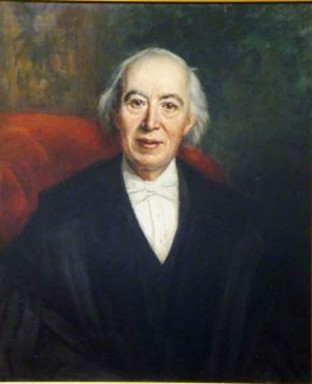Top Qs
Timeline
Chat
Perspective
Willibald Beyschlag
German theologian (1823–1900) From Wikipedia, the free encyclopedia
Remove ads
Johann Heinrich Christoph Willibald Beyschlag (5 September 1823 – 25 November 1900 in Halle an der Saale) was a German theologian from Frankfurt am Main.
Remove ads
Biography
Summarize
Perspective
He studied theology at the Universities of Bonn and Berlin, afterwards serving as an assistant pastor in Koblenz (1849), then as a pastor in Trier (1850). During the following year, Beyschlag began working as a religious instructor in Mainz. In 1856 he became a court preacher in Karlsruhe, and four years later, he was appointed a professor of practical theology and New Testament exegesis at the University of Halle.[1]
Beyschlag was the leader of the Kirchenpartei[2] called Mittelpartei ("Middle Party"), and in 1876, with Albrecht Wolters, founded the Deutsch-evangelische Blätter (a publication of the Mittelpartei in the Kirche der Altpreußischen Union). Because of the combative nature of the magazine, he was once sued for libel.[1][3] Also, he was a primary catalyst in the founding of the Evangelischer Bund (Protestant Confederation) —[4] he believed that only in unity could German Protestantism find strength.
He was a leading supporter of the Vermittlungstheologie and was opposed to Chalcedonian Christology.[4] Also, he stood for the rights of the laity, and believed in the autonomy of the church, leading him to be in favor of separation of church and state.[5][6] Beyschlag was viewed as an antagonist of the Roman Catholic Church and a sharp critic of Ultramontanism.[1]
Remove ads
Selected works
In 1891 he published Neutestamentliche Theologie, oder, geschichtliche Darstellung der lehren Jesu und des Urchristenthums nach den neutestamentlichen Quellen, a book that was later translated into English and published as "New Testament theology; or, Historical account of the teaching of Jesus and of primitive Christianity according to the New Testament sources" (translation by Rev. Neil Buchanan; 1895). The following are a few of his many other writings:
- Die Christologie des Neuen Testaments : ein biblisch-theologischer Versuch, 1866 – Christology of the New Testament.
- Godofred, ein Märchen fürs deutsche Haus, 1890 – Godofred. A fairytale for German households.
- Das Leben Jesu, 1887 – The life of Jesus.
- Bischof D. Reinkens und der deutsche Altkatholizismus, 1896 – Bishop Joseph Hubert Reinkens and German Old Catholicism.
- Deutschland im Laufe des neunzehnten Jahrhunderts, 1900 – Germany during the nineteenth century.[7]
Remove ads
References
Wikiwand - on
Seamless Wikipedia browsing. On steroids.
Remove ads

